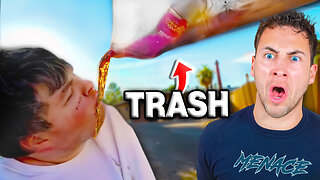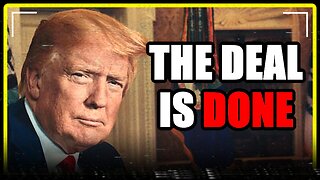Premium Only Content

Free Speech on The Internet Hangs on Section 230 Of the COMMUNICATIONS DECENCY ACT
WHAT IS SECTION 230 OF THE COMMUNICATIONS DECENCY ACT
Twenty-six words tucked into a 1996 law overhauling telecommunications have allowed companies like Facebook, Twitter and Google to grow into the giants they are today.
Free Speech on The Internet Hangs on Section 230 Of the COMMUNICATIONS DECENCY ACT
Under the U.S. law, internet companies are generally exempt from liability for the material users post on their networks.
Section 230 of the 1996 Communications Decency Act - itself part of a broader telecom law - provides a legal 'safe harbor' for internet companies.
But Republicans increasingly argue that Twitter, Facebook and other social media platforms have abused that protection and should lose their immunity - or at least have to earn it by satisfying requirements set by the government.
Section 230 probably can't be easily dismantled. But if it was, the internet as we know it might cease to exist.
Just what is Section 230?
If a news site falsely calls you a swindler, you can sue the publisher for libel. But if someone posts that on Facebook, you can't sue the company - just the person who posted it.
That's thanks to Section 230, which states that 'no provider or user of an interactive computer service shall be treated as the publisher or speaker of any information provided by another information content provider.'
That legal phrase shields companies that can host trillions of messages from being sued into oblivion by anyone who feels wronged by something someone else has posted - whether their complaint is legitimate or not.
Section 230 also allows social platforms to moderate their services by removing posts that, for instance, are obscene or violate the services' own standards, so long as they are acting in 'good faith.'
What happens if Section 230 is limited or goes away?
'I don´t think any of the social media companies would exist in their current forms without Section 230,' Kosseff said. 'They have based their business models on being large platforms for user content.'
There are two possible outcomes:
Platforms might get more cautious.
This outcome could actually hurt none other than the president himself, who routinely attacks private figures, entertains conspiracy theories and accuses others of crimes.
Another possibility: Facebook, Twitter and other platforms could abandon moderation altogether and let the lower common denominator prevail.
-
 10:58
10:58
Go Right News with Peter Boykin
2 months agoExtended Opening Monologue - Is Mexico a Partner or a Threat to America
181 -
 LIVE
LIVE
BEK TV
21 hours agoTrent Loos in the Morning - 7/30/2025
147 watching -
 4:10
4:10
Blackstone Griddles
13 hours agoCajun Dogs with Bruce Mitchell
10.5K1 -
 29:38
29:38
Uncommon Sense In Current Times
14 hours ago $0.20 earnedIs Doubt a Sin? Wrestling with Faith & Belief (Part 1) | Dr. Randal Rauser
10K5 -
 8:29
8:29
The Art of Improvement
20 hours ago $0.14 earned4 Strategies To Accelerate Your Personal Growth By 200%
3.72K1 -
 LIVE
LIVE
The Bubba Army
22 hours agoTrump Pardoning Diddy? - Bubba the Love Sponge® Show | 7/30/25
1,852 watching -
 10:53
10:53
Nikko Ortiz
1 day agoWORST Clips On The Internet
68.2K23 -
 27:44
27:44
DeVory Darkins
17 hours ago $6.31 earnedCHILLING update regarding NYC shooter Lefties LOSING IT over Sydney Sweeney
21.9K89 -
 10:05
10:05
MattMorseTV
16 hours ago $11.81 earnedHe actually did it...
84.3K39 -
 2:09:53
2:09:53
Midnight In The Mountains
2 hours agoMorning Coffee w/ Midnight & The Early Birds of Rumble | Tsunami's Railing Cali ...
6.8K1